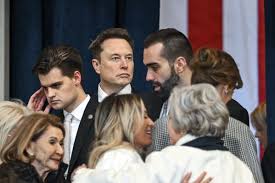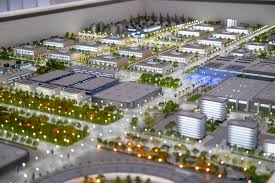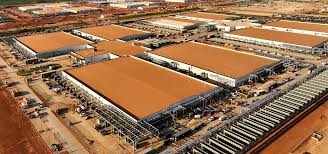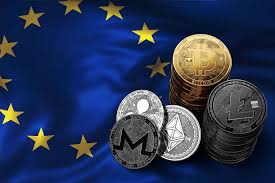Like many others in the tech industry, Jeremy Lyons used to consider himself to be rather apolitical.
He had only participated in a protest once, during the first few days of Donald Trump’s first term as president, when he and other Google employees left the company’s Silicon Valley headquarters to oppose immigration laws.
They were joined by the CEO and co-founder of Google.
Lyons’ second, against Trump, was last weekend, but it felt completely different.
There were no tech executives in sight, just months after several had joined Trump at his January inauguration.
The man leading thousands of marchers with a bullhorn in downtown San Jose on April 5 was another tech worker who would not reveal his full name for fear of being recognized by Trump supporters.
The marchers were warned not to harass drivers of Tesla vehicles, which have transformed from a symbol of environmental futurism in Silicon Valley to a pro-Trump icon.
The 54-year-old Lyons believes the shift speaks as much to the state of Silicon Valley in the last 25 years as it does to the current climate of fear that surrounds many Trump detractors.
During that period, Lyons observed, “One of the things I’ve seen is a shift from a nerdy utopia to a money-first, move-fast-and-break-things mentality.”
There is a political divide between tech executives and their employees.
There are still differences in the political philosophies of the tech sector.
Many of the regular employees of the software industry have stayed liberal, but they have also grown more anxious and disillusioned as some of the highest echelons of Silicon Valley started to lean right politically.
Their attitude contrasts sharply with that of the well-known tech executives who have adopted a conservative populist philosophy
Ann Skeet, who assists in running a center at Santa Clara University that studies the ethics of the computer industry, stated,
“I think you’re seeing a real gap between the leadership elite here in Silicon Valley and their workforce.”
“A lot of people haven’t been happy with the change,” said Lenny Siegel, a longstanding liberal leader in the valley and former mayor of Mountain View.
“A small group of individuals has received the attention.”
The most notable example of that is Elon Musk, the richest person in the world and the CEO of the most well-known electric vehicle firm. Musk played a significant role in cutting federal agencies during Trump’s presidency.
A number of tech millionaires have joined Musk, including venture capitalist Marc Andreesen and investor David Sacks, who funded Trump’s campaign and served as the White House’s czar for cryptocurrencies and artificial intelligence.
Trump’s inauguration in Washington was also attended by Mark Zuckerberg, the CEO of Meta, and Sundar Pichai, the CEO of Google.
After Trump threatened to imprison Zuckerberg last summer for money he directed toward local election offices in several states during the 2020 coronavirus pandemic, the then-candidate became enraged and started praising Zuckerberg.
Laptops 1000In addition, Zuckerberg co-hosted an inauguration reception for billionaire Republican contributors and contributed $1 million to the president’s inauguration fund.
Trump has appointed billionaires to several positions in his government, and his backing from affluent tech executives prompted Democratic President Joe Biden to caution that the US may turn into an oligarchy controlled by elites.
Given that the industry employs people from all over the world, the valley and its executives were a stronghold of opposition to the Republican Party throughout Trump’s first term, particularly on immigration.
In light of this, thousands of people recently demonstrated against Trump and Musk’s activities at a rally held in a park in downtown San Jose.
Silicon Valley has tended to lean Democratic despite changes in the tech sector.
In the November election, Santa Clara County, which includes the majority of Silicon Valley, shifted 8 percentage points in favor of Trump over Democrat Kamala Harris, mirroring the California trend.
The county remained a Democratic stronghold despite that movement, voting for the then-vice president 68% to 28%.
The Santa Clara GOP’s new executive director, Dave Johnson, stated that while the party has added a few new members from the county, few of them are from the tech sector, stating that “we’re still in the belly of the beast.”
If the water had been frozen, there would be a slight sheen on top. In my opinion, there are no cracks in the ice.
Although the valley has historically leaned Democratic, its political makeup is unique in that it combines libertarian individualism, Bay Area activism, and faith in science to fix the world’s problems with a general distaste for becoming overly involved in Washington affairs.
Even as the tech sector has evolved, that has remained constant.
Resilient firms that tapped into their employees’ aspirations to improve the world were the driving force behind the tech boom.
In 2018, when it and other businesses like Meta, the company that owns Facebook and Instagram, had become global giants, Google removed the phrase “don’t be evil” from its code of conduct.
Recent layoffs at the corporations have shocked an industry that seemed poised for unrestricted growth just a few years ago.
According to Jan English-Lueck, a professor at San Jose State University who has spent more than two decades researching Silicon Valley culture, entrepreneurs previously envisioned creating companies that would transform the world.
“If you’re involved with a startup, you’re hoping that you’ll be absorbed in a way that’s profitable,” she explained.
Some tech workers are unhappy with the direction the business is taking.
There was growing dissatisfaction among some in the industry over the trajectory of the sector even before several well-known IT leaders turned toward Trump.
Ida Rose Sylvester has a company that encourages entrepreneurs abroad to adopt a Silicon Valley-style strategy.
“Now I feel nauseous,” she remarked.
The rising inequality in the valley and the environmental cost of all the energy required to run data centers, AI, and cryptocurrency already made Sylvester unhappy.
She participated in anti-Trump demonstrations in 2017, but she felt that enthusiasm wane after he lost to Biden in the 2020 election.
“After Biden won, I witnessed a lot of individuals leave politics. It seemed to be going well,” Sylvester remarked. “Everything wasn’t fine.”
“Now it’s worse,” she remarked. Last weekend, during a nationwide day of protests against the new administration, she assisted in planning one of several marches throughout the valley.
The demonstration in downtown San Jose might have appeared to be any anti-Trump demonstration.
A sizable group of protestors, mostly middle-aged and older, were chanting anti-oligarchs and holding signs criticizing Musk and the president.
However, it was evident that the audience was from Silicon Valley, which is still in shock over Trump’s attacks on the nation’s checks and balances as well as the behavior of the valley’s top executives.
“It scares me that the wealthiest are getting all the money,” Dianne Wood, a startup employee, said. “Unfortunately, you’ve got the Zuckerbergs and Elon Musks of the world who are taking that over.”
“Everyone is telling me to turn off my phone’s facial recognition,” Wood continued. “We’re all afraid.”
AI worker Kamal Ali claimed that the change made him feel deceived.
“There is a breach in trust. Many workers are really displeased with the situation,” he stated. “It will always be different.”

















